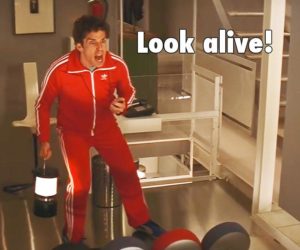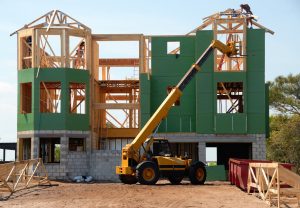Know How to Handle a Fire
It’s one of the worst-case scenarios we can imagine. You wake up, smell smoke or even worse, see flames flickering on a wall. Your home is on fire!
What do you do to make sure you and your family are safe?
Fire is the reason that insurance was created in the first place. Those of us in the business know this risk better than just about anyone – your amazing local fireman obviously excluded.
And if you don’t know where your local fire station is, check out this handy link to know where help will come from in case of a fire.
If you don’t take anything else from this article, know the Red Cross basics: GET OUT, STAY OUT, CALL 911.
Now that you know where that is, let’s talk about what to do if you’re hit with this unfortunate tragedy.
But to make a pretty scary topic easier to deal with, I’m going to use images and references that are more lighthearted than scary. Got it? Let’s go.
1: Be Prepared For a Fire

While this step is technically what to do BEFORE you have a fire, it is still important enough to talk about here.
The first thing you need to do is to come up with a Fire Safety Plan. This does not have to be an elaborate, complicated document. Just jot down the following things:
- Smoke Alarms – Make sure to double-check smoke alarms to see if the batteries are good, if they are in a good location, and if you have a place in the home that could use another one.
NOTE: This is your first line of defense against fire. Keep them in good condition, test them regularly, and make sure your family knows what they sound like. - Plan Evacuations – You should know how to get out of every room in your house in case of a fire. Thinking these things through beforehand can be the difference between a close call and a tragedy.
- Have a Plan – Know the safe exits from your home, know where you are to meet once everyone has escaped, and know who is to call 911.
- Get Safety Gear – Fire extinguishers are the obvious ones. But also get ladders for upper story windows, flashlights and even masks stashed throughout the house.
- Practice/Drill – This doesn’t have to be like Ben Stiller in the picture above. But make sure you at least walk your family through the above information once a year so it will be fresh in everyone’s mind if something does happen. This is especially important if you have young children.
Now that you’re prepared, let’s talk about the ways to stay safe in the actual situation.
2: Alert Your Household

If you see signs of a fire, the first thing you should do is YELL.
This might seem kind of funny at first, but the best way to keep your loved ones safe is to alert them to danger. Even if you hear a fire alarm, don’t assume that everyone is aware of what is going on.
Communication is key. Get the word out as fast as you can and let everyone know that there is an emergency.
If you see fire in the room you are in, let everyone know that you see fire. Helping to locate the fire also can help keep others safe.
Whatever the best way to communicate might be – shouting, calling on the phone, texting or in-house intercoms – make sure everyone is aware that there is a fire and to get out of the house.
3: Find a Way Out

Hopefully, you know from your Fire Safety Plan how to get out of whatever room you might be in. Regardless, assessing the situation and knowing how to get to safety is crucial.
- Find the exit that will let you get out of the house safely.
- If you find a hot doorknob, see smoke from under a door, or find your path blocked by fire, locate another way out.
- Once outside, head to an agreed-upon safe place and call 911.
The key here is to not be a hero. Don’t try anything crazy, don’t take massive risks, and certainly don’t try to put out a blazing building by yourself.
It is a good idea to protect yourself from smoke while you are trying to get out. Smoke inhalation, not the fire itself, is the biggest cause of fatalities during house fires.
Stay low, away from rising smoke, and hold something over your mouth. If you don’t have a mask, use a wet piece of fabric as the water will help block toxins from the smoke.
Whatever you do, don’t stay in a room unless you are trapped. Try to get out and get to safety. If you are blocked, seal the bottoms of doors or other entrances with wet towels or something similar to keep smoke out of the room.
4: Call For Help

Now that you are out, it’s time to get all of the help you can get! Make sure everyone is a safe distance away and call the authorities.
Alert the authorities by dialing 911 and reporting the fire. Give as much information as you can and be calm and thorough. It may seem nearly impossible after what you just went through, but the easier you are to understand the faster firefighters and other safety personnel can get to you.
This is the most important thing to do after a fire. Don’t try to go fight the fire yourself. Don’t get your neighbors and dive into the flames to save that 86-inch television you just got for the big game.
Call 911, stay safe and wait for help to arrive.
After you’ve reported the fire and everyone is out safely, it may be a good time to report the fire to your insurance company. You have two ways of doing that.
- Call your insurance agent.
- Call your insurance company.
If you call your agent, make sure they are open during business hours. If it is the middle of the night, your agent may not be available. And your odds of having a fire increase in the afternoon and at night.
According to the Red Cross:
Home fires can happen at any time, but they generally increase during the fall and winter, with December and
January being the peak months. Home fires are also more common on Saturday and Sunday, and tend to peak
between 6:00 and 7:00 PM.
But back to your agent – most agents have a website where you can report claims or at the least get your company’s claims phone number. Which brings us to…
Calling your company. If you have had a fire, it is never a bad idea to call your company’s claims number to report the claim. The sooner an adjuster can come to view your property, the sooner you will be on track to getting your repairs underway and your life back in order.
After the Flames Go Out

Once everything is over, it’s time to rebuild.
Work with your insurance agent and adjuster to put the pieces together for your claim. Make sure your policy works for you – after all, this is exactly why you have insurance.
Many policies provide money for renting a temporary location while the rebuilding is underway. If you aren’t sure about that on your policy, ask your agent.
Your coverage should also cover the complete cost of reconstruction. If you tried to get coverage lower than the value of your home, you may have shortchanged yourself.
And if you aren’t sure about the coverage you have, ask an agent to do a review for your homeowners policy.
Or ask us.
We have some of the best insurance companies in the entire industry backing up our passionate dedication to homeowners insurance.
And if you are wondering, “passionate dedication?” Well, yeah. There is nothing more important than helping someone repair there home. Nothing is more personal or more vital to a family living the life they have worked hard for.
If you’re curious about having a second pair of eyes to look over your policy and see if there is something better for you, let us know.
Call us, email us, or click below.
The time to do something about your policy is now, before a fire. A quick conversation could be the thing that rebuilds you from the ground up.
See more of the Alliance Insurance Safety Series.

